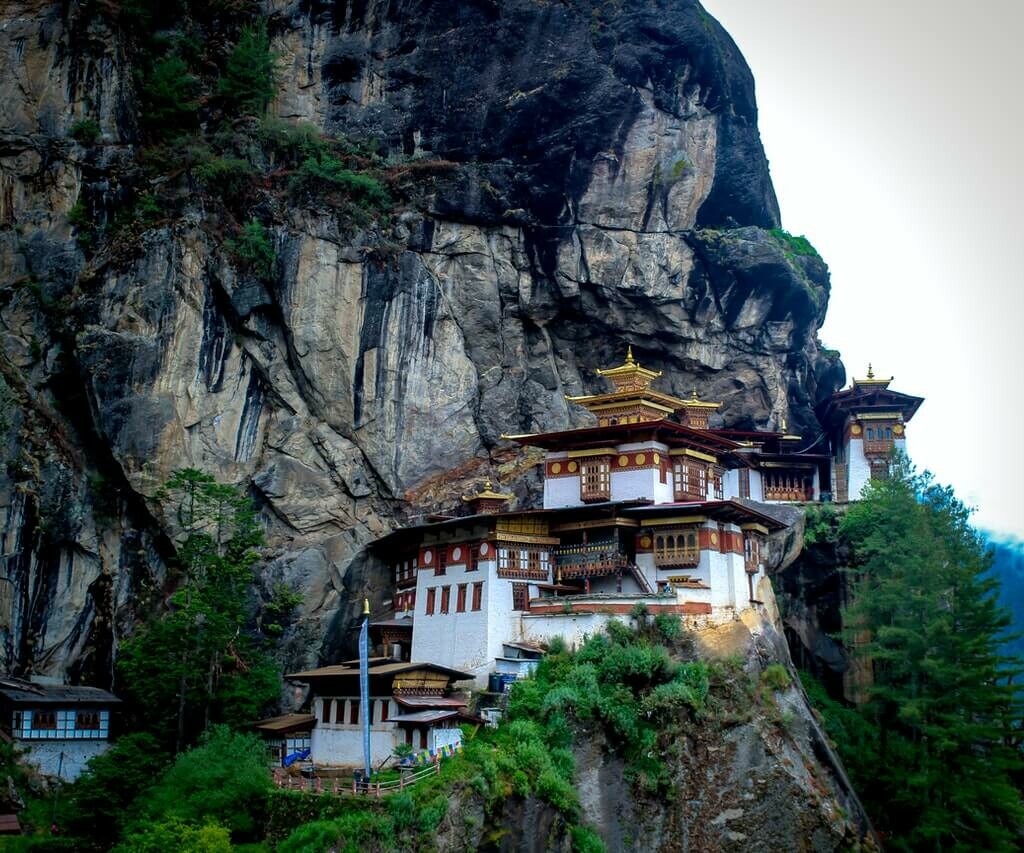Bhutan stands out for its balance between Buddhist tradition and modernity. Although Buddhism permeates every aspect of life, religion is not taught in schools, being reserved for the family sphere. The country prioritizes environmental sustainability, keeping 60% of its territory forested and regulating tourism to preserve its culture and nature. The mandatory retirement policy ensures a continuous generational turnover, while the economy is based on agriculture and the sale of hydroelectric power.
Bhutan: How Secular Education and Buddhism Coexist in a Sustainable Country
Bhutan, nestled among towering mountains and wrapped in dense forests, presents itself as a fascinating kingdom where Buddhism, more than just a doctrine, becomes a way of life that infuses everything.
This Himalayan nation (Himalaya) is renowned for prioritizing the happiness of its inhabitants, but also for placing environmental sustainability and cultural preservation at the center of its policies. Most strikingly, despite its profound religious fervor, the teaching of faith in schools is not part of formal education.
Unlike many countries where religious instruction explicitly appears in the curriculum, Bhutan opts to keep religion out of the classroom, reserving it for the family and community spheres. Nevertheless, its society remains strongly linked to Buddhist practices and values, which are reflected in traditional attire, temples, and daily customs.
A Deep-Rooted Buddhist Devotion
The first impression any visitor gets when traveling through Bhutanese provinces is the omnipresence of monasteries, stupas and prayer flags fluttering in the wind.
Spiritual rituals set the pace of the day, from the way incense is lit to the respectful treatment given to animals. Likewise, the traditional architecture and colorful garments—the gho for men and the kira for women—reaffirm the national identity.
Meanwhile, this pious atmosphere is lived naturally in both streets and fields, blending devotion with everyday activities. Murals of the Buddha and prayer wheels abound along the roads, so that those who pass by can turn them according to tradition. However, children primarily learn these values and religious practices at home, through the example of their parents and teachings passed down from generation to generation.
Religion Outside the Classroom
The absence of religion in the school curriculum does not imply a lack of interest in Buddhist culture. Rather, it signifies a clear separation between secular learning and spiritual teaching.
In fact, Bhutanese parents are usually very active in instilling in their children the principles they consider most important: compassion, kindness, and respect. This family commitment reduces the need to include a specific religious subject in public education.
Nevertheless, the fact that Buddhism is not institutionalized within schools does not prevent spirituality from permeating students’ lives. Buddhist celebrations and festivals, such as Tsechu, are held with great fervor and are an essential part of the national holiday calendar.
On many occasions, students participate in cultural activities and group ceremonies, yet they keep their studies focused on subjects like math, science, and the humanities, aligned with global academic progress.
A Model of Sustainability
On the other hand, Bhutan is globally recognized for its strong commitment to protecting nature. Its Constitution requires that at least 60% of its territory remain forested, and those at the pinnacle of political power must step down before the age of 65, including the king. In this way, the country promotes a forward-looking vision that encourages generational renewal and avoids stagnation.
In line with this ecological mindset, climbing the highest mountains is prohibited to minimize environmental impact and preserve the flow of rivers that support the agricultural and livestock sectors. Likewise, the sale and consumption of tobacco are heavily restricted, although, interestingly, a variety of craft beers is available and popular among young people.
Challenges and Perspectives
Even so, Bhutan faces challenges inherent to modernity. One of these is the gradual introduction of cell phones and television, which has sparked budding consumerism in the cities. Additionally, there is a Hindu minority of Nepali origin settled in the south, known as the lotshampa, who have experienced social tensions in the past.
Currently, the government is working to integrate these communities and ensure peaceful coexistence.
Similarly, the average monthly salary is around 400 dollars, so subsistence farming and livestock remain predominant in much of the territory. Technology and tourism—the country’s second-largest source of income—have been expanding gradually but are regulated by requiring a local guide to accompany visitors, thereby moderating the cultural and environmental impact.
The Indispensable Cultural Legacy
Ultimately, Bhutan exemplifies a unique model where tradition, faith, and modernity coexist in astonishing balance.
Buddhist culture, far from being imposed in public spaces, is passed on through example and family life. And although the country faces the challenges of globalization, it strives to maintain a sustainable governmental plan that reinforces Bhutanese identity in every corner.
Its firm commitment to national happiness—globally known as “Gross National Happiness”—has served as an inspiration for other nations seeking to measure well-being beyond economic indicators. This small kingdom, with its rivers that distinguish males and females by their flow, and with its unusual policy of mandatory retirement, stands as a beacon of cultural diversity and environmental responsibility.
Finally, Bhutan’s landscape illustrates an extraordinary case of peaceful coexistence between modernity and the preservation of ancestral customs. In a world that grows more homogeneous every day, Bhutan invites us to reflect on the possibility of technological advancement without sacrificing the very essence of culture or spiritual convictions, all while not imposing religion in schools.
Such is the strength of a country that, with modest resources, makes its faith and its respect for nature the foundation of its social stability and its constant quest for happiness.
Mike Rivero » Spiritual and Mystical Tourism in Asia





